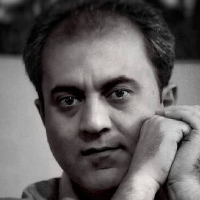An overview of the silence zone in Shafiei Kadkani’s poems: Woman(Based on Pierre Macherey)
Pierre Macherey(born in 1938) is a French Marxist philosopher and literary critic. He is known as an influential figure in the formation and development of post-structuralism and Marxist literary criticism. The Marxist criticism analyses literature based on the historical (economic and social0) context. His main contribution in the area of criticism is the book entitled “A Theory of Literary Production” released in 1966. This book includes the main topics in Marxist criticism and as its title suggests, through a material viewpoint, it examines literature not as a subjective creation of the author’s mind but as a product like other manufactured products, with the difference that here the raw material is ideology. One of his best theories in this book is the silence zone. The most important parts of the theory in elaborated in two chapters of the book: “Implicit and explicit” and “The spoken and the unspoken”. Any literary work has silences and pauses without which the work could not exist. Understanding a work depends on the exploration of this zone as well as its interpretation. Macherey believes that silence is life-giving. The ideas of any literary work originates from a given silence and this silence forms the work. Thus, a work is not self-sufficient, but inevitably is accompanied with the silence, a silence without which the work could not exist. Understanding a work should acknowledges such presence. Therefore, it would be reasonable if we ask that a work implies which untold statements. Around any explicit utterance is an implicit utterance. To state something, some other things should be ignored. In this study, we attempt to explain a very important silence zone in Mohammad Reza Shafiei Kadkani’s poems, i.e. his attention to women. Shafiei is a well-known poet in contemporary Iranian literature. His language and style has made him a well-established poet among Iranian readers. As such, describing his works is a must in contemporary literary criticism. The research on various aspects of his poems is abundant, but the ideas represented in his works have not been analyzed yet. His viewpoint on the women has not been elaborated. Women are not represented in his poems explicitly. Most critics claim that women are not mentioned as earthly, achievable individuals. His women are mostly typical historical women. He mostly has dialog with a prototypical, subjective woman, not a contemporary, living one. Our major question here is that why Shafiei encounters the feminine characters with maximum care? Why he ignores earthly love? The absence of woman and woman-hood is obvious in his poems and we cannot take it as something accidental. In Shafiei’s poems, women are almost absent and the absence cannot be casual. Here, we shed light on the intratextual and intertextual reasons behind this absence and silence. An intratextual reason could be ignoring the personal “I”, poetics of committed poetry, and an affection with the traditional poetry. The poet’s ideology (Iranian, religious and leftist) and his professorship are introduced as some intratexutal motives. Likewise, a psychological explanation is outlined that says Shafiei has made an exchange in his mind. According this assumption, the poet has filled the empty position of women with other elements and concepts. In psychology, substitution is a defense mechanism in which the person cannot express his or her excitements due to shame, and therefore he or she transfers the experienced feelings to other objects. This transfer reminds the concept of metaphor. Such substitution does not take place just in the level of word, but sometimes the transferred object happens to be visual. In Kafka’s Metamoorphesis, for example, the hero is embodied as a cockroach. These changes are related to the unconsciousness or the suppressed side of the self. Shafiei has substituted the love for earthly woman with the love to mother, homeland, Persian language and literature, Iranian culture, nature and pigeons. It should be mentioned that before the Islamic revolution, Shafiei had a sympathy with active militia. In those groups, love affair was taboo. In effect, the intellectual, revolutionary culture of that period welcomed such taboo. The militants put their life on their struggle and had no time for love. Due to his military nature, Shafiei was overwhelmed with such feelings too. Once he passes the early years of his life and steps into middle-aged period, Shafiei puts more attention on philosophical ideas. He fills the empty place of women with counterpart subjects. To extend, we can present other reasons too and we also interpret them, but this important empty place cannot be ignored.


